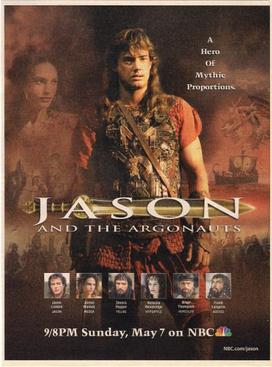Title of the work
Studio / Production Company
Country of the First Edition
Country/countries of popularity
Original Language
First Edition Date
First Edition Details
Jason and the Argonauts. Dir. by Nick Willing, written by Matthew Faulk and Mark Skeet; produced by Robert Halmi Sr, music by Simon Boswell. Los Angeles, CA: Hallmark Entertainment, May 7, 2000.
Running time
Format
Date of the First DVD or VHS
Awards
2000 – nominated for Primetime Emmy Awards for Outstanding Makeup for a Miniseries, Movie or a Special, for Outstanding Special Visual Effects for a Miniseries etc.;
nominated by Online Film & Television Association for OFTA awards for Best Miniseries, Best Production Design, Best Sound, Best Visual Effects, Best New Theme Song in a Motion Picture or Miniseries;
2001 – nominated by the Academy of Science Fiction, Fantasy & Horror Film for Saturn Award (Best Single Genre Television Presentation);
nominated by the American Society of Cinematographers for ASC Award for Outstanding Achievement in Cinematography in Movies of the Week / Mini Series / Pilot;
nominated for Golden Satellite Award for Best Miniseries.
Genre
Action and adventure fiction
Myths
Television series
Target Audience
Young adults
Cover

Courtesy of Sonar Entertainment, under the Wikimedia Common Rights, Date: 23 March, 2014. Source: Magazine promotional advertisement of Jason and the Argonauts, 2000, (accessed: August 17, 2018).
Author of the Entry:
Elżbieta Olechowska, University of Warsaw, elzbieta.olechowska@gmail.com
Peer-reviewer of the Entry:
Susan Deacy, University of Roehampton, s.deacy@roehampton.ac.uk

Courtesy of the Author.
Nick Willing
, b. 1961
(Director)
British film and television writer and director. Born in London to an English father (artist Victor Willing) and a Portuguese mother (artist painter Paula Rego), Willing spent most of his childhood until age 12 in Portugal before moving to London, where he later attended The National Film and Television School graduating at the age of 21. He began his cinematographic work producing music videos and writing scripts. He is currently best known for his 2017 BBC documentary about his mother (Paula Rego, Secrets & Stories), several feature films (Photographing Fairies 1997, Alice in Wonderland 1999, Doctor Sleep 2002, The River King 2004, Altar 2014), and a number of TV mini-series and series, among them two inspired by Greek mythology, Jason and the Argonauts 2000 and Olympus 2015, both featured in OMC Survey.
Official website (accessed: May 29, 2018).
Bio prepared by Elżbieta Olechowska, University of Warsaw, elzbieta.olechowska@gmail.com
Casting
Jason London as Jason,
Jolene Blalock as Medea, Olga Sosnovska as Atalanta,
Frank Langella as King Aeëtes,
Natasha Henstridge as Hypsipile,
Derek Jacobi as Phineus,
Dennis Hopper as Pelias,
Brian Thompson as Hercules,
Adrian Leser as Orpheus,
Olivia Williams as Hera,
Angus Macfadyen as Zeus
et al.
Summary
Zeus and Hera, looking like a young and handsome couple, peer down at mortals from heaven among the clouds. They are observing Jason’s life from the murder of his father Aeëtes by his uncle Pelias, through his childhood years spent in anonymity away from his home, his return to the King’s court, the forced expedition to seek the Golden Fleece for his uncle, his visit to and escape from the Amazons, the finding of the seer, the arrival in Colchis, Medea’s help in getting the fleece, and escape from Colchis, to the return voyage with the fleece, Pelias’ betrayal, death, and finally, his recovery of the throne and ruling happily ever after with Medea as his Queen. The divine couple Zeus and Hera influence, each separately, the course of events; Hera hides her actions from her husband, and pretends only to observe the mortals with indifference, when in fact she is countering all Zeus’ moves and achieves a happy end for the mortals, in blatant contrast to the ancient sources for the myth.
Analysis
Gideon Nisbet (p. 62, see in Further Reading) in his mention of the miniseries focuses on the elimination from the story of Hylas, Hercules’ love interest. Downplaying or simply not including any homosexual allusions in the miniseries is a typical example of presenting Greek myths for children. The whole design of the series showing the gods as giants in the sky who look down on the mortals and manipulate them like puppets, emphasizes its fairy-tale character. The death of Medea’s brother looks not like a heinous fratricide but an act of pure self-defence against a duplicitous and unscrupulous prince. The happy ending for Jason and Medea is even mirrored by a reconciliation between Zeus and Hera. Willing’s Jason and the Argonauts is mythological fairy-story, complete with successfully completed trials for the protagonist and just deserts for all characters, mortal and divine.
Further Reading
Lovatt, Helen, “Gutting Argonautica? How to make Jason and the Argonauts Suitable for Children?” in Dunstan Lowe and Kim Shahabudin, eds., Classics for All. Reworking Antiquity in Mass Culture, Newcastle upon Tyne: Cambridge Scholars Publishing, 2009, 17–38.
Nisbet, Gideon, Ancient Greece in Film and Popular Culture, 2nd ed., Liverpool: Liverpool University Press, 2008, 62.


